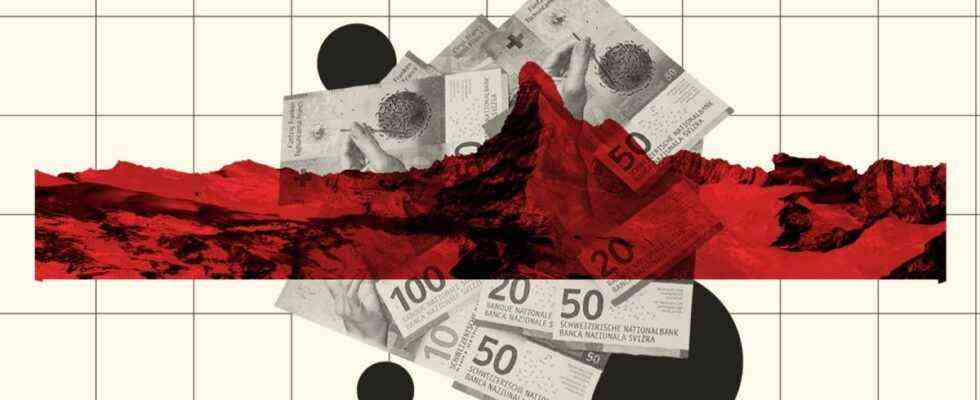Jörg Gasser, the head of the Swiss Bankers Association, has sharply criticized the Suisse Secrets research. The reports by the research association about the SZ are “inaccurate and one-sided,” Gasser writes in a publication that was distributed on Monday evening opinion post. Foreign media would paint a clichéd picture of the Swiss financial center here. “The fact is that Switzerland consistently implements international standards and has strict regulations to prevent money laundering and terrorist financing.”
The SZ revelations show that the major Swiss bank Credit Suisse has given brutal rulers, corrupt politicians, war criminals and other criminals access to its accounts for decades. The research raises doubts that Credit Suisse has always fulfilled its duty of care with these problematic clients. And: Some of the accounts discussed by Suisse Secrets existed until at least the beginning of 2022.
But even apart from the questions raised by the Suisse Secrets, things are going badly at the big bank. At the moment there is a case against her before the Federal Criminal Court for money laundering, the incidents in question are said to have occurred between 2004 and 2008. In autumn 2021, it was announced that Credit Suisse had to pay hundreds of millions in fines to British and US authorities for a corruption scandal in Mozambique in 2013. And then there was the collapse of the US hedge fund Archegos Capital and the bankruptcy of the British-Australian financial institution Greensill Capital: Both will not happen until 2021, both of which are further low points for Credit Suisse in terms of risk management and compliance.
Nevertheless, Jörg Gasser says that the Swiss financial center has done its homework. He describes the Suisse Secrets as “a journey through decades in which many things should have gone differently – not just for us”. As CEO of the Bankers Association, he wants to help the Swiss banking center to deal with problems and change. “But I distance myself from the fact that sensationalism is practiced, which in no way serves to process or improve, but only serves the purpose of media ‘sales’ and ultimately wants to harm Switzerland as a whole.”
The Bankers Association is not the only Swiss voice to sharply criticize the Suisse Secrets research network. In a comment the newspapers of the CH Media Group castigate the revelations as “misguided pack journalism”. The commentator writes: “Anyone who reduces the scandalous machinations to the factual core will be sobered by how little remains.” A little more cautious, but similarly critical expresses the The New Zurich Times: Yes, banking secrecy gave the local financial center “guaranteed inflows of money and fat profits” for a long time, but that is now in the past. “The research results and the furore with which they are presented seem to have fallen out of time: as if banking secrecy had never been lifted and the automatic exchange of information had never been introduced.” Also the trade newspaper emphasizes: “The dossiers that have now been presented, which are intended to prove how ‘immoral’ Credit Suisse, indeed the entire Swiss financial center, are today, are primarily a reflection of the past.”
While left-wing Swiss politicians took the revelations as an opportunity to prepare new initiatives to tighten banking rules in parliament on Monday, politicians from the FDP and the right-wing conservative SVP were critical of the Suisse Secrets. “The cases shown here reflect an old world,” said Ruedi Noser, FDP member of the SZ. “The fact is, however, that the picture drawn does not match today’s Swiss financial center or today’s Credit Suisse.” The publisher, journalist and SVP MP Roger Köppel raged in its video format “Weltwoche Daily” downright against the SZ, “a very left-wing paper”, whose journalists put “their left-wing private morals” above everything else and would not understand that the bank customer law was “an achievement of civilization” that served to protect privacy.
Abroad, meanwhile, outrage about Switzerland is growing. The European People’s Party (EPP), the strongest political group in the European Parliament, already had the EU Commission on Monday askedto examine the possible inclusion of Switzerland in the EU’s black list of countries with a high risk of money laundering. SPD Member of the European Parliament Joachim Schuster told the SZ on Tuesday: “The Social Democratic MEPs in the EU Parliament have been calling for the list of tax havens to be improved for a long time – it is possible that the ‘Suisse Secrets’ will finally shake up the Commission and the Council to take action here. ” The Greens in the European Parliament are also signaling support in this regard: “We need a tougher stance towards Switzerland and, above all, Swiss banks that are involved in money laundering,” said MP Rasmus Andresen. “In that sense, we are happy to put pressure on this with the EPP and the other groups in the European Parliament.” The EU Commission should not duck away.
For the German economic ethicist Ulrich Thielemann, who himself worked as a scientist in Switzerland, the Suisse Secrets primarily show the “profitability extremism” that has found its way into all large companies, not just in Switzerland. He sees the problem above all in political Switzerland, which has allied itself with the banks. “Official Switzerland gave the world the finger with its banking law,” says Thielemann. In fact, the Swiss parliament tightened the banking law in 2015; since then, even journalists have been banned from evaluating leaked bank data. According to Thielemann, it was “breathtaking” how carelessly the Swiss political establishment sacrificed “the dignity of the rule of law to the interests of the banking lobby”.

